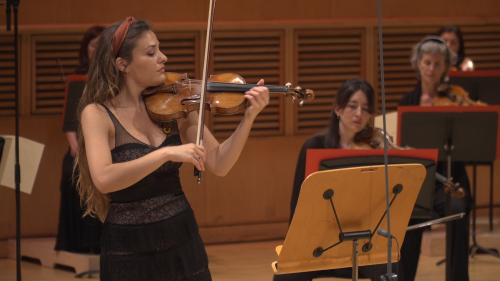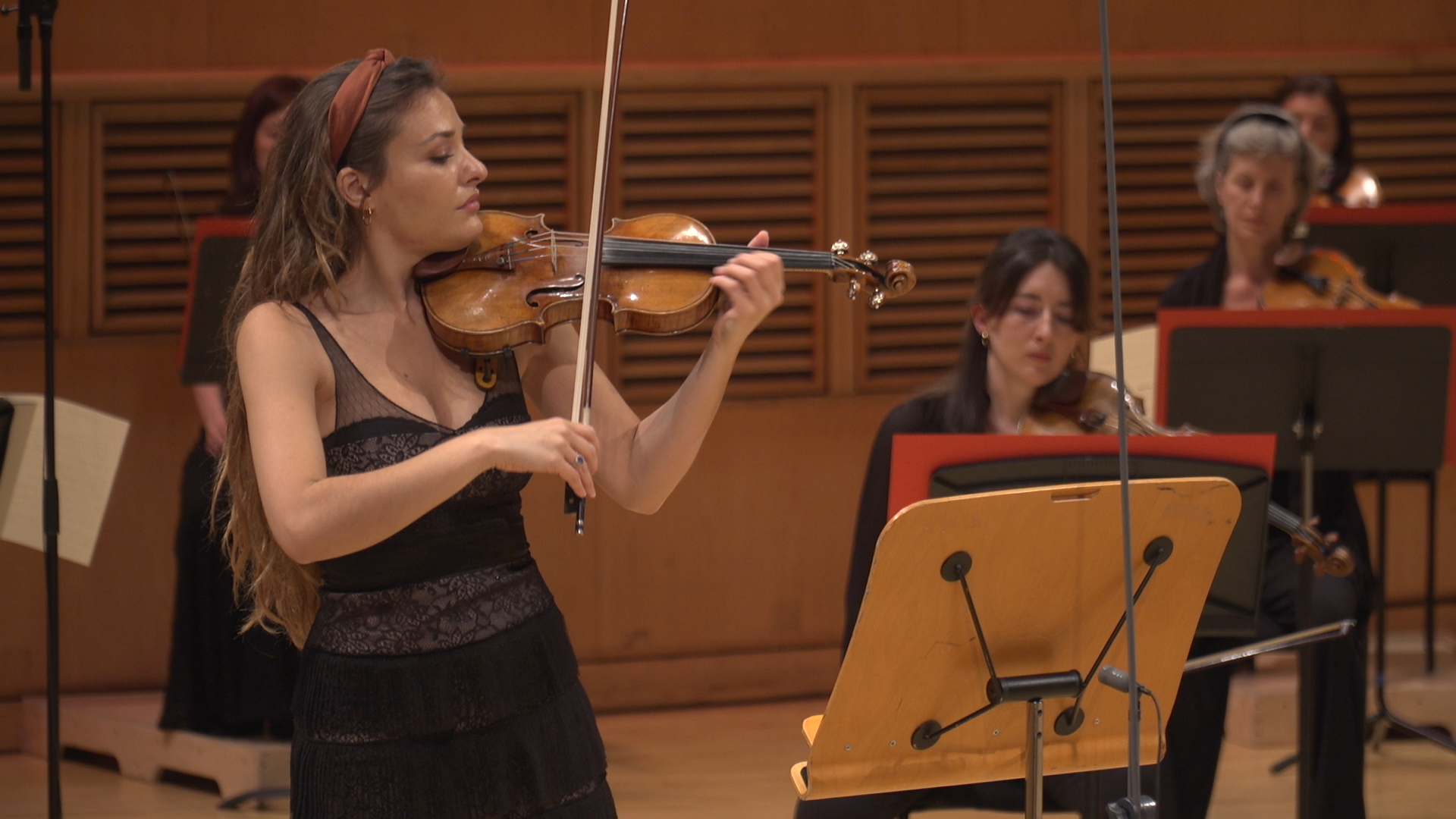 United Kingdom Bartók, Szymanowski: Nicola Benedetti (violinist), Royal Scottish National Orchestra / Elim Chan (conductor). Recorded at Glasgow Royal Concert Hall and streamed (directed by Jack Hunter) on the RSNO’s Digital Concert Hall 11.6.2021. (GT)
United Kingdom Bartók, Szymanowski: Nicola Benedetti (violinist), Royal Scottish National Orchestra / Elim Chan (conductor). Recorded at Glasgow Royal Concert Hall and streamed (directed by Jack Hunter) on the RSNO’s Digital Concert Hall 11.6.2021. (GT)

Traditional (arr. Christopher Duncan) – Stac Dona from The Lost Songs of St Kilda
Szymanowski – Violin Concerto No.2 Op.61
Bartók – Concerto for Orchestra
In continuing the RSNO’s Polska Scotland season it was good to hear another central European piece in Bartók’s masterly Concerto for Orchestra just a week after Lutosławski’s work of the same name, together with music by the late romantic Karol Szymanowski. Indeed, it has been an enterprising series with backing from the Ministry of Culture from Poland and the Adam Mickiewicz Institute in bringing us little known music from both neglected and celebrated composers. A novel feature of this concert was mixing Polish and Hungarian music with a contemporary Scottish piece.
The opening miniature for harp and string orchestra was a fascinating choice as part of the Scotch Snaps series of commissions of brief orchestral pieces by young Scottish composers. Christopher Duncan has another musical career as a pop musician, and he was among several composers chosen to orchestrate some of the Lost Songs of St Kilda. St Kilda is an archipelago far off the coast of the Outer Hebrides of Northern Scotland, of which Stac Dona is a tiny sea stack near St Kilda’s two main islands. The opening bars on strings were atmospheric evoking the splash of waves on a northern Scottish beach, with the wind whistling in the distance, and as the harp entered against the fragile string playing, one can sense the sun coming out from behind a grey northerly cloud. The writing is beautifully impressive, colourful and marvellously well played by the orchestra; it’s just a pity that in this series of Scotch Snaps, supported by the John Ellerman Foundation more time could not be given to such new compositions by our Scottish composers.
It was with Szymanowski First Violin Concerto that Nicola Benedetti won the BBC Young Musician of the Year award in 2004 which helped launch her brilliantly successful career. Now she is Scotland’s most celebrated musician and something of a musical ambassador; her charitable and educational activity is second to none. In her pre-concert interview, Benedetti mentioned that this performance of the composer’s 1933 Second Violin Concerto was her first collaboration with Elim Chan. Chan herself said that it was great to work with the violinist in the rehearsals for the concert, and it was for Chan her first time conducting Szymanowski and that she was ‘amazed by the affinity of the composer with the mountain area of southern Poland, and the citing of special folk rituals, the humidity of the countryside and its people.’

Benedetti opened quietly on her Gariel Stradivarius (1717) violin with a fragile melody accompanied by the piano and clarinet, and she rather thoughtfully increased the tempo with a captivating folk theme joined by the whole orchestra and then followed by a nocturnal passage with shimmering harmonies. The brass high up in the choir stalls joined in adding sizzling colour to the harmonies, at the core was a sharply piquant cadenza from the soloist embroidered by some devilish playing which took us into an almost dream-like passage. There was an echo of a horn solo by Christopher Gough before we quickly returned to bright folk music with stirring wind chords rushing to a boisterous jolly folk festival in the closing bars.
I know of few twentieth-century composers who managed to embrace modernism, by intertwining his country’s rich folk culture into his finest masterworks, yet it is still surprising how little we hear of Bartók’s music. Occasionally one of his concertante pieces is heard, and perhaps The Miraculous Mandarin in one of its versions, but apart from his six quartets, the Hungarian’s music is still not heard as often as he should be in today’s concert repertoire.
In her introduction to the Bartók piece, Chan commented that it seemed to her that ‘each of the five movements “sings” with the Hungarian accents adding a rich flavour to the whole work’ and certainly, she displayed a profound understanding of the complex tapestry of Bartók’s score. In the opening Introduzione: Andante non troppo–Allegro vivace, there was a velvety dark promise on the cellos and violas and some stunningly dazzling virtuosity from the flute of Katherine Bryan before the slow section brought an air of foreboding with a graceful folksong heard on the strings. This was followed in turn by captivating solos from the trombone of Davur Juul Magnussen, the oboe of Adrian Wilson, and Maya Iwabuchi on violin all bringing a mood of suspense. The flutes and the harp shrieked suddenly in dread, and this idiom was appeased somewhat by Timothy Orpen on the clarinet. The switching of momentum and musical imagery was impressive through these quickly moving passages, all masterfully contrived by Chan in her precise tempo changes and intense knowledge of the score.
In the second part, Giuoco delle coppie: Allegretto scherzando, the tantalising rhythm of the side drum was echoed by the bassoon and folk-like harmonies on the two oboes against melodious strings and Bryan’s sparkling flute playing. In the third movement; Elegie: Andante non troppo, the bright woodwind were captivating in a mysterious passage and introducing an idea of enlightenment turning to drama from the whole orchestra with the cor anglais of Henry Clay and the piccolo of Janet Richardson sounding heavenly. In the fourth movement Intermezzo interrotto: Allegretto yet again the strings were stunning in their subtly dark intonation leading to an oboe solo and a playful flute and clarinet heard against sedate elegiac violas and the cheeky citation of the Shostakovich Leningrad Symphony, made fun of by the woodwind and brass, before a return to a more melancholic mood. In the Finale: Presto, the brass chorale led to a swift tempo and a bright mood before a dashing folk idea led us to a plateau of otherworldly music on the strings. The timpani then announced a race to the finish with the whole orchestra bursting in folk festivity to gloriously end this masterpiece of twentieth-century music.
This concludes this series of streamed concerts many of which have been memorable particularly for their innovative repertoire around themes of little-known music by composers of colour and women in music, and latterly of neglected Polish music. In organising this highly successful series of concerts – which have garnered worldwide subscriptions – huge thanks should go to the team of video and audio technicians and engineers under the guidance of director Jack Hunter and producer Phil Hobbs at the RSNO Centre.
Gregor Tassie
For more about the RSNO click here.
